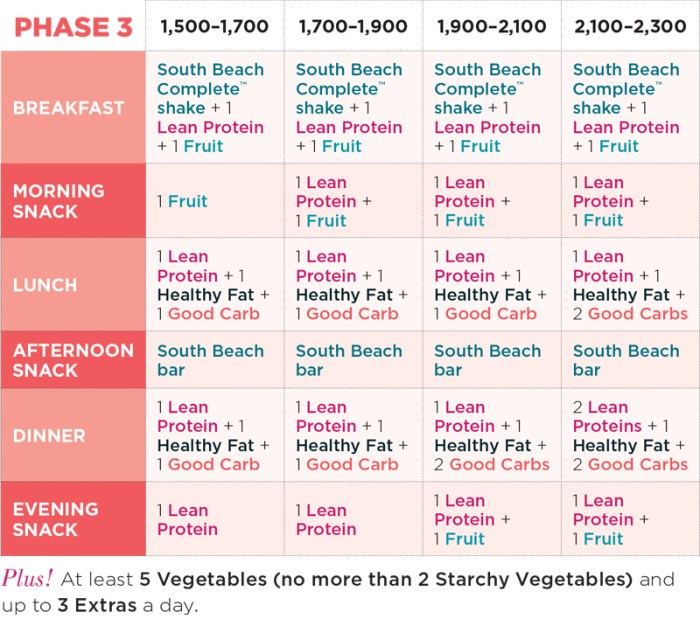Palm Beach Diet: Unlocking its secrets. This isn’t your average diet plan; it’s a carefully crafted approach to nutrition, emphasizing specific food groups and portion sizes to help you achieve your weight loss goals. We’ll delve into the core principles, explore its nutritional aspects, and examine both the potential benefits and risks. Get ready to uncover whether the Palm Beach Diet is the right fit for your lifestyle.
We’ll cover everything from sample meal plans and practical tips for long-term adherence to addressing common concerns and exploring scientific backing. This in-depth guide aims to equip you with the knowledge to make an informed decision about incorporating the Palm Beach Diet into your life.
Potential Health Effects: Palm Beach Diet

The Palm Beach Diet, characterized by its emphasis on low-carbohydrate consumption and increased protein and healthy fat intake, presents a range of potential health effects. Understanding both the potential benefits and risks is crucial before embarking on this or any restrictive diet. This section will delve into the specific impacts on weight management, blood sugar control, and other potential drawbacks.
Weight Management
The Palm Beach Diet’s primary appeal lies in its potential for weight loss. By significantly reducing carbohydrate intake, the body shifts from primarily burning glucose for energy to utilizing stored fat. This metabolic shift, known as ketosis, can lead to a noticeable reduction in body weight, particularly in the initial phases of the diet. Studies have shown that low-carbohydrate diets, similar in principle to the Palm Beach Diet, are often effective for short-term weight loss.
However, long-term success depends on adherence to the dietary plan and the adoption of sustainable lifestyle changes. The rate of weight loss can vary greatly depending on individual factors such as metabolism, activity level, and initial body weight. For example, an individual with a higher body mass index might experience more rapid initial weight loss compared to someone who is already at a healthy weight.
Blood Sugar Levels
Restricting carbohydrate intake, a core component of the Palm Beach Diet, can significantly impact blood sugar levels. By limiting the influx of glucose into the bloodstream, the diet may help improve insulin sensitivity and reduce blood sugar spikes, particularly beneficial for individuals with prediabetes or type 2 diabetes. This effect is largely due to the reduced carbohydrate load, leading to a more stable and controlled release of glucose.
However, it’s important to note that the impact on blood sugar can vary depending on the individual’s metabolic response and the specific composition of the diet. Careful monitoring of blood sugar levels is advised, especially for individuals with existing diabetes or related conditions. Consulting with a healthcare professional before starting the diet is strongly recommended.
Potential Risks and Drawbacks
While the Palm Beach Diet offers potential benefits, it’s essential to acknowledge potential risks and drawbacks. The restrictive nature of the diet can lead to nutrient deficiencies if not carefully planned. The exclusion of entire food groups can limit the intake of essential vitamins, minerals, and fiber. Furthermore, the diet’s high fat content may raise concerns for individuals with cardiovascular issues.
Some individuals may experience side effects such as constipation, fatigue, headache, and “keto flu” in the initial stages of adaptation to ketosis. Finally, the sustainability of the diet in the long term is a significant concern, as strict adherence can be challenging for many individuals. The potential for rebound weight gain after discontinuing the diet is also a possibility.
Benefits and Risks Comparison
| Benefits | Risks |
|---|---|
| Potential for significant weight loss | Risk of nutrient deficiencies |
| May improve blood sugar control | Potential for constipation, fatigue, headache, and “keto flu” |
| Increased satiety due to high protein and fat content | May raise concerns for individuals with cardiovascular issues |
| May improve lipid profiles in some individuals | Difficulty maintaining long-term adherence |
| May lead to improved energy levels in some individuals | Potential for rebound weight gain after discontinuation |
Scientific Evidence and Research

The Palm Beach Diet, like many other weight-loss plans, lacks robust, large-scale scientific studies specifically designed to evaluate its efficacy and long-term effects. Existing research on its core components – low-carbohydrate consumption and emphasis on certain foods – offers some insights, but direct evidence pertaining solely to the Palm Beach Diet itself is limited. Therefore, evaluating the diet’s claims requires analyzing the available research on related dietary approaches and considering their limitations.The primary research relevant to the Palm Beach Diet focuses on the effects of low-carbohydrate diets.
Numerous studies have explored the impact of these diets on weight loss, blood sugar control, and other metabolic markers. These studies often show short-term weight loss success, with some indicating improvements in markers associated with type 2 diabetes. However, the long-term effectiveness and potential side effects remain subjects of ongoing investigation.
Low-Carbohydrate Diet Studies and Their Findings
Many studies investigating low-carbohydrate diets have demonstrated short-term weight loss benefits. A meta-analysis published in the Cochrane Database of Systematic Reviews, for example, reviewed several randomized controlled trials comparing low-carbohydrate diets to low-fat diets. The meta-analysis generally found that low-carbohydrate diets led to greater short-term weight loss compared to low-fat diets. However, the long-term effectiveness and maintenance of weight loss were less consistent across studies.
The methodology varied significantly across these trials, including differences in the specific macronutrient ratios, the duration of the intervention, and the participant populations. These variations make it challenging to draw definitive conclusions about the overall effectiveness of low-carbohydrate diets in the long term.
Limitations of Existing Research on Low-Carbohydrate Diets, Palm Beach Diet
One significant limitation is the relatively short duration of many studies. While short-term weight loss is often observed, long-term adherence and sustained weight loss are more difficult to achieve and are less well-documented. Furthermore, the heterogeneity in study designs, participant characteristics, and dietary protocols makes direct comparisons and meta-analyses challenging. Many studies lack sufficient follow-up periods to assess the long-term health consequences of adhering to a low-carbohydrate diet.
The potential for nutrient deficiencies on restrictive low-carbohydrate diets is another concern, and many studies don’t adequately address this aspect. Finally, the lack of studies specifically focusing on the Palm Beach Diet’s unique aspects (specific food combinations, emphasis on certain types of fats, etc.) makes it difficult to assess its effectiveness independently of general low-carbohydrate diets.
Methodology of Relevant Studies and Their Conclusions
Most studies employ randomized controlled trials (RCTs), considered the gold standard in research. Participants are randomly assigned to either a low-carbohydrate diet group or a control group (often a low-fat diet). Researchers then monitor various parameters, including weight, body composition, blood pressure, blood glucose levels, and lipid profiles. The results are analyzed statistically to determine whether there are significant differences between the groups.
While RCTs provide valuable data, the limitations mentioned earlier (short duration, heterogeneity, lack of long-term follow-up) must be considered when interpreting the results. Many studies conclude that low-carbohydrate diets can lead to short-term weight loss, but the long-term effects and overall health implications remain a topic of ongoing research and debate. The lack of large-scale, long-term studies specifically examining the Palm Beach Diet’s unique components makes it challenging to draw definitive conclusions about its efficacy and safety.
The Palm Beach Diet, with its focus on specific food combinations and portion control, presents a unique approach to weight management and overall health. While promising potential benefits like improved blood sugar levels and weight loss, it’s crucial to consider potential drawbacks and individual needs. This comprehensive guide has provided a detailed overview, empowering you to assess its suitability for your personal circumstances and health goals.
Remember, consulting a healthcare professional before making significant dietary changes is always recommended.

